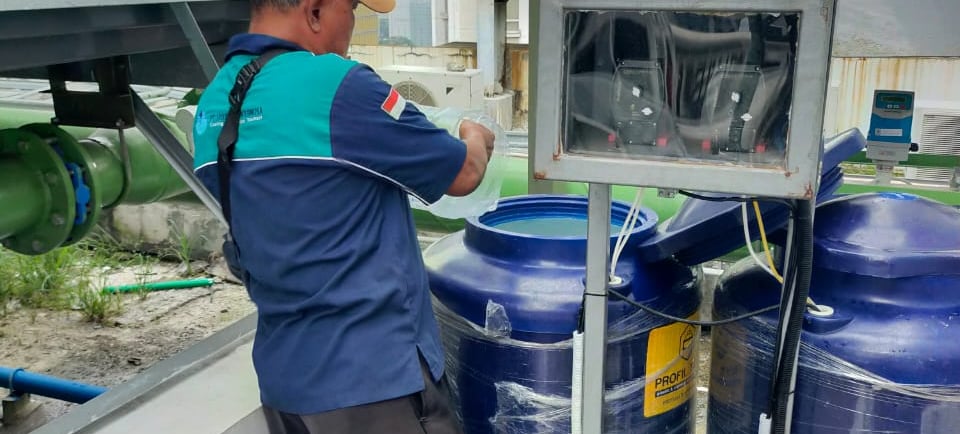How Water Quality Testing Laboratories Improve System Efficiency


Water is one of the most vital resources in modern industry. From cooling processes in power plants to maintaining hygiene in food and beverage production, industries rely heavily on consistent water quality. However, water is not always free of impurities, and without proper monitoring, even small imbalances in its composition can cause significant issues. This is where water quality testing laboratories play a central role in ensuring operational efficiency and system longevity.
In this article, we will explore why laboratory testing is essential, how it contributes to efficiency, and why PT Jaya Sakti Internusa provides a trusted approach for industries across Indonesia.
The Critical Role of Water Quality in Industrial Systems
Industrial systems require water that meets specific quality standards to operate efficiently. Contaminants such as suspended solids, dissolved minerals, heavy metals, or biological growth can compromise processes and damage equipment. For example, in cooling towers, excess minerals cause scaling, while untreated organic matter can trigger biofouling. Both reduce heat transfer efficiency and increase energy use.
Poor water quality also has compliance implications. Many industries must adhere to environmental regulations on wastewater discharge. Failure to meet these standards can result in fines, legal challenges, or reputational harm. In Indonesia, the Ministry of Health and environmental authorities provide strict guidelines on safe water use and wastewater disposal.
By regularly testing water in certified laboratories, companies can identify potential issues before they escalate. This proactive approach not only protects systems but also supports regulatory compliance and environmental responsibility.
How Water Testing Laboratories Enhance Efficiency
Water testing laboratories use advanced instruments and standardized methods to analyze physical, chemical, and biological parameters. These laboratories provide accurate insights into water composition, which is crucial for industries to take corrective actions.
Efficiency improvements are achieved in several ways:
Preventing Scaling and Corrosion: By monitoring hardness, alkalinity, and pH, companies can adjust treatment to prevent costly damage.
Reducing Energy Consumption: Clean and balanced water improves system performance, lowering energy demand in boilers, chillers, and cooling towers.
Optimizing Chemical Use: Testing helps operators use the right dosage of chemicals, avoiding waste and reducing costs.
Ensuring Consistency: Regular analysis maintains water stability, which is critical for industries like pharmaceuticals and electronics.
With reliable laboratory data, industries can make informed decisions that extend equipment life, improve productivity, and reduce operational risks.
The Connection Between Testing and Sustainability
Sustainability is no longer optional for industries; it is a necessity. Water testing laboratories contribute to sustainable operations by promoting resource efficiency and environmental protection. When water quality is properly managed, industries can recycle and reuse water with greater confidence. This minimizes freshwater consumption and reduces wastewater discharge.
Testing also supports circular economy initiatives, where treated wastewater can be safely returned to production cycles or discharged without harming ecosystems. By using laboratory data to optimize treatment processes, industries reduce their carbon footprint and align with global sustainability goals.
For businesses in Indonesia, where water resources are both vital and vulnerable, laboratory testing helps balance industrial growth with ecological stewardship. Companies that integrate testing into their operations demonstrate responsibility to stakeholders, regulators, and communities.
Challenges Without Regular Water Testing
Industries that fail to invest in regular water testing face a range of challenges that can affect both operations and reputation. One of the most common issues is equipment failure. Undetected scaling or corrosion reduces system performance and leads to unexpected shutdowns. These interruptions not only cause financial losses but can also delay production schedules.
Another challenge is non-compliance. Discharging untreated or poorly monitored wastewater may lead to legal penalties, environmental damage, and loss of credibility. Over time, the costs of non-compliance far exceed the investment in testing and treatment.
Finally, there is the challenge of inefficient chemical use. Without accurate data, operators may overuse or underuse treatment chemicals, leading to waste, higher expenses, and potential safety risks. These inefficiencies highlight the importance of reliable laboratory support.
Why PT Jaya Sakti Internusa Is a Trusted Partner
In Indonesia’s industrial water sector, PT Jaya Sakti Internusa has built a reputation for delivering comprehensive water treatment solutions that combine technology, expertise, and long-term support. Part of this commitment involves ensuring that water quality testing is an integral part of system management.
By working closely with water quality laboratories, the company helps industries monitor critical parameters and design effective treatment strategies. The data-driven approach ensures that every solution is tailored to the unique conditions of each facility, resulting in improved reliability and cost efficiency.
Moreover, PT Jaya Sakti Internusa emphasizes compliance and sustainability. Its services align with national regulations while supporting global best practices in environmental management. Industries that collaborate with the company not only safeguard their operations but also contribute to a more sustainable future.
Integrated Approach: From Testing to Treatment
What sets water testing apart when integrated with treatment systems is its ability to create a feedback loop. Testing identifies issues, treatment addresses them, and follow-up testing confirms effectiveness. This continuous cycle ensures that water systems remain stable and efficient.
With providers like PT Jaya Sakti Internusa, industries benefit from end-to-end solutions. From raw water intake to wastewater discharge, every stage is supported by laboratory insights and expert treatment. This integrated approach reduces risks, lowers costs, and provides peace of mind for operators managing complex facilities.
Ultimately, the combination of laboratory testing and professional treatment services is what keeps industries competitive in an era where efficiency and sustainability go hand in hand.
Conclusion: Testing as the Foundation of Efficiency
Water treatment technology can only deliver its full value when supported by reliable laboratory testing. Without it, industries risk inefficiency, non-compliance, and system failures. With it, companies can achieve optimized performance, lower costs, and stronger sustainability outcomes.
Water quality testing laboratories act as the backbone of industrial efficiency by providing the accurate data needed for informed decision-making. For industries in Indonesia, choosing a trusted partner like PT Jaya Sakti Internusa ensures that laboratory insights are seamlessly integrated into water treatment systems.
By prioritizing water testing, companies are not only protecting their infrastructure but also contributing to responsible resource management and environmental preservation. In a world where every drop counts, testing is not an option—it is a necessity.
